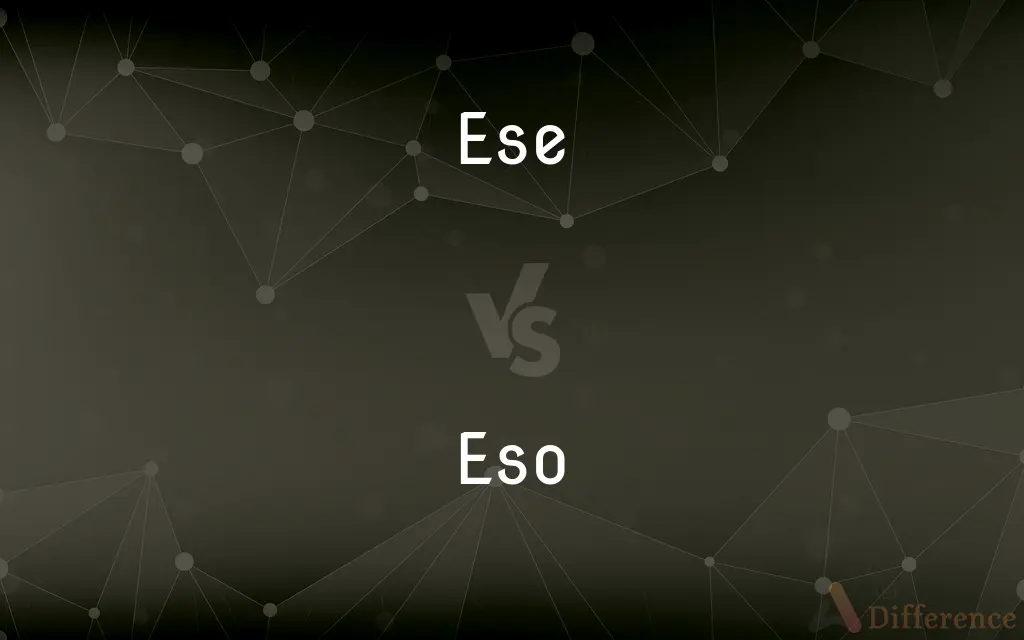ese vs. eso — What's the Difference?
Edited by Tayyaba Rehman — By Fiza Rafique — Published on December 18, 2023
"Ese" is a Spanish colloquial term often used to refer to a friend or man, while "eso" is a Spanish neutral pronoun meaning "that."

Difference Between ese and eso
Table of Contents
ADVERTISEMENT
Key Differences
In the Spanish language, "ese" often serves a colloquial purpose. It's akin to calling someone "dude" or "bro" in English. Predominantly used in certain regions, it can signify camaraderie or familiarity. On the contrary, "eso" plays a grammatical role. As a neutral pronoun, it refers to an unspecified object or idea, translating to "that" in English.
While "ese" is primarily known for its informal usage in conversation, it's crucial to be aware of the context. This term is more prevalent in some areas, notably parts of Mexico and Southern California. On the other hand, "eso" is ubiquitous across the Spanish-speaking world. It's a standard word learners encounter early in their studies, and it does not change based on the region.
The function of "ese" is generally to refer to a person. When someone uses "ese" in a sentence, they're likely addressing someone directly or talking about a third person informally. In contrast, "eso" cannot refer to a person. Instead, it points to things, concepts, or situations, serving as a placeholder of sorts when the gender of a noun is not specified or known.
The gender-neutral aspect of "eso" sets it apart from other demonstrative pronouns in Spanish. Spanish nouns have gender, being either masculine or feminine. "Eso" stands out because it doesn't lean either way, making it unique. Meanwhile, "ese" can be gendered, as it has a feminine counterpart "esa," but when used colloquially to address someone, it typically isn't gender-specific.
In slang, "ese" has cultural implications. It's been incorporated into various facets of popular culture, especially in music and movies that highlight Chicano or street culture. "Eso," being a grammatical term, doesn't carry these cultural connotations, remaining neutral and consistent in its application.
ADVERTISEMENT
Comparison Chart
Primary Meaning
Informal term for "dude" or "bro"
Neutral pronoun for "that"
Usage
Colloquial
Grammatical
Refers to
Typically a person
Things, concepts, situations
Gendered
Can be, but not in slang usage
No
Cultural Implications
Often tied to Chicano or street culture
None, standard across Spanish-speaking regions
Compare with Definitions
Ese
Spanish for "that" when referring to a masculine noun close to the listener.
Hand me ese book, please.
Eso
Used to refer to unspecified objects or ideas.
Eso is what I was talking about.
Ese
A colloquial term referring to a friend or man.
Hey, ese, long time no see!
Eso
A word indicating an undefined thing or situation.
What is eso on the table?
Ese
Informal address similar to "dude" in English.
What's up, ese?
Eso
A neutral pronoun in Spanish meaning "that."
I don't understand eso.
Ese
A term of camaraderie or familiarity.
Don't worry, ese, I've got your back.
Eso
Neutral demonstrative pronoun differing from its gendered counterparts.
I believe eso is true.
Ese
A slang term prevalent in Chicano culture.
You know Juan? He's a cool ese.
Eso
A standard term in Spanish grammar.
Eso is not correct.
Ese
(US) dude, man. (Usually used vocatively).
Ese
(obsolete) Ease; pleasure.
Ese
Ease; pleasure.
Ese
The compass point midway between east and southeast
Common Curiosities
How is "eso" used in a sentence?
"Eso" is a neutral pronoun, typically meaning "that" and referring to things or ideas.
What does "ese" commonly refer to?
"Ese" is often an informal term for "dude" or "bro" in Spanish.
Is "ese" considered slang?
Yes, "ese" is colloquial slang, especially in certain regions.
Is "ese" used universally across all Spanish-speaking regions?
While understood, "ese" as slang is more prevalent in areas like parts of Mexico and Southern California.
Is "ese" recognized in formal Spanish dictionaries?
While "ese" as a demonstrative is recognized, its slang usage might not be in more traditional dictionaries.
Can "eso" refer to people?
No, "eso" refers to things, concepts, or situations, not people.
What's the feminine counterpart of "ese"?
The feminine counterpart is "esa."
Are there other words similar to "eso" in Spanish?
Yes, there are gendered equivalents like "ese" (that, masculine) and "esa" (that, feminine).
Is "ese" ever used in formal settings?
Typically not, as "ese" is considered informal slang.
How essential is "eso" in learning Spanish?
"Eso" is fundamental, as it's a basic demonstrative pronoun learners encounter early on.
Can "ese" and "eso" be used interchangeably?
No, they serve different purposes in language and conversation.
How do native speakers perceive the use of "ese" by non-natives?
It varies. Some may see it as cultural appreciation, while others might find it inauthentic or appropriative.
Is "eso" ever used colloquially like "ese"?
No, "eso" retains its grammatical role and doesn't carry the same colloquial connotations as "ese."
Does "ese" have cultural connotations?
Yes, especially in Chicano culture and in popular culture representations of it.
Do "ese" and "eso" have direct English translations?
"Ese" as slang might be translated to "dude" or "bro," while "eso" translates to "that."
Share Your Discovery

Previous Comparison
Inbound Marketing vs. Outbound Marketing
Next Comparison
Aldi Stores vs. Lidl StoresAuthor Spotlight
Written by
Fiza RafiqueFiza Rafique is a skilled content writer at AskDifference.com, where she meticulously refines and enhances written pieces. Drawing from her vast editorial expertise, Fiza ensures clarity, accuracy, and precision in every article. Passionate about language, she continually seeks to elevate the quality of content for readers worldwide.
Edited by
Tayyaba RehmanTayyaba Rehman is a distinguished writer, currently serving as a primary contributor to askdifference.com. As a researcher in semantics and etymology, Tayyaba's passion for the complexity of languages and their distinctions has found a perfect home on the platform. Tayyaba delves into the intricacies of language, distinguishing between commonly confused words and phrases, thereby providing clarity for readers worldwide.














































